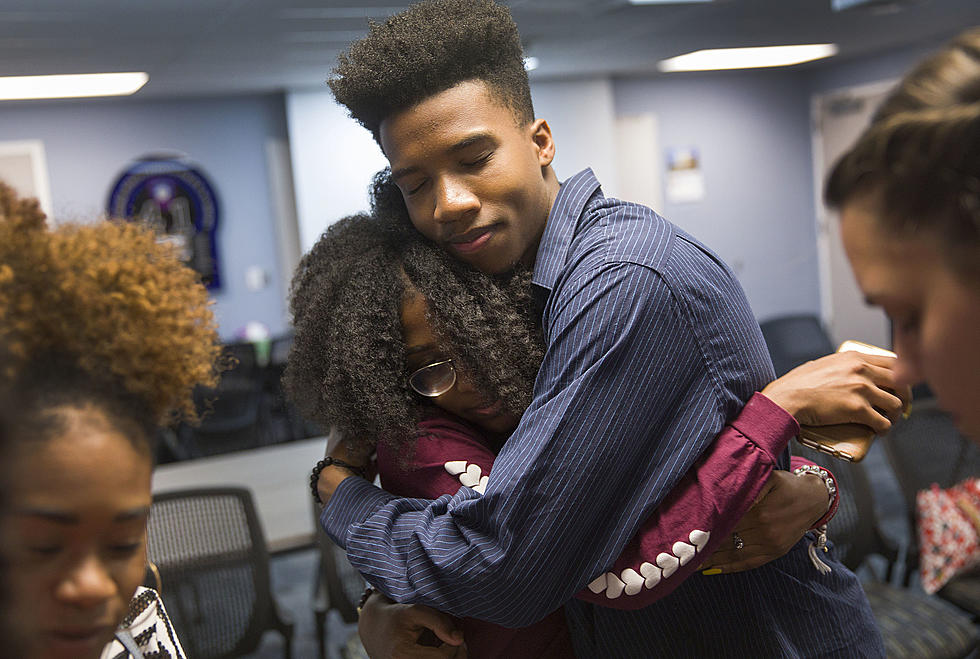
What You Might Not Know About Autism
April is World Autism Month, so I thought I'd write a little something today to help raise awareness - because, unlike with so many other awareness campaigns that don't actually do much of anything other than line the pockets of "non-profits" and event organizers (we all know about cancer by now, so how about we ease back on raising money for awareness and start using fundraisers to, I dunno, fund actual research toward a cure or something), more people really, really need to be aware of autism - in all its forms.
Autism is a spectrum, not a one-size-fits-all diagnosis. In fact, you probably know an autistic person, even if you aren't aware of it. And you're probably not aware of it, which is exactly why we need awareness campaigns.
I grew up in the '80s, back before there was really any kind of awareness about autism at all, otherwise I probably would've been put on the spectrum. I was a goofy, highly literal shy kid who obsessed over details, used really big words, hated change, and whose best friends were my computer and my cat. If I'd grown up a couple of decades later, after more people - including doctors - were aware of the many manifestations of autism, I probably would've been diagnosed with something like Asperger's, which is now part of the autism spectrum.
However, I didn't grow up in the age of increased awareness. Instead, I was shuffled into a special class a few times a week (ostensibly to work on my penmanship, which was a total lie), where I'd "play" with other weirdo kids who didn't quite fit in. I don't remember a whole lot of specifics about the class, but I do remember that it featured some kind a janky teeter-totter and a weird plastic thing with a ball in the middle.
I actually liked the class, though. We played all sorts of different games, and we almost always got to have time with THE PARACHUTE – which was the biggest highlight of gym class in elementary school – but we didn’t have to share it with the unclean masses of normal kids. It was just us weirdos, so we could totally spaz out and nobody would punch us later or push us into the urinals when we were trying to pee.
Because that tended to happen.
A lot.
To give you an idea of how just ill-prepared schools were to handle kids like me back in the '80s, the "special class" teachers also suggested to my parents that they could help me overcome my shyness and aversion to social situations by buying me a ventriloquist dummy, with the reasoning being that, by learning to speak through the dummy, I would overcome my disdain for ever having to actually talk to people. So my parents took me to the toy store, and we bought one.
His name was Willie Talk, which I guess was supposed to be a clever take on “Will he talk?” or something, but I just called him Willy and never did very much with him.
Mostly, he just kinda creeped me out. But I played along and made a show of trying to master a skill that would SURELY expand my social circle, because who doesn’t love the dude who whips out his wooden dummy at parties? Amirite?*
*Technically, he was plastic.
Of course, there was only so much a class like that and teachers like those could do for me, since I don't think anyone at the school really understood what us kids were dealing with. I didn't understand body language, for example. It took me a long time to figure that out though, because it came so naturally to other people. I had no idea.
I had to work to understand the unknown, unspoken language everyone around me was using, which meant I first had to realize I wasn't communicating with them the same way they were communicating with me, and then I had to read books and study people for years before I could finally read body language - and make no mistake, I still have to actively read it, even as an adult. I don't react to it on the same subconscious level as normal people. I have to pay attention and draw from experience, which actually makes me very good at figuring out what people are really saying - even when they don't want anyone to know what that is.
I still can't use it, though. My expressions don't often match the words coming out of my mouth, people think I'm annoyed even when I'm not, and my wife is a saint for putting up with me. I'm still a weirdo.
If I'd grown up in a time when more people were aware of the symptoms of autism, I probably wouldn't have had to learn to navigate them on my own. And I was lucky, because if I should've been placed on the autism spectrum, I would've probably been classified as high-functioning, although that's a stupid and pretty offensive term. People with autism aren't high-functioning or low-functioning. They're just people, and like all people, they're good at some things and not so good at others. Making the distinction as some kind of global catch-all standard doesn't help anyone.
Autism can manifest in many ways that take patience and understanding to deal with. Parents of severely autistic children have do to a whole lot more parenting than those of "normal" children, for instance. If there's even such thing as normal. (I tend to think there isn't.) But awareness campaigns aren't for the parents of autistic children. In fact, they're not even for those on the spectrum.
Awareness campaigns are for everyone else.
The more people know about autism, the more likely they are to understand those who have it. People love to make fun of the computer nerds who come around from the IT department to fiddle with wires and make awkward conversation while fixing your electronics, but chances are they can't really help how they act or talk. There's a reason highly technical, less socially demanding careers attract the sort of "nerd" people enjoy making fun of, after all.
Which isn't to say that all autistic people are good with computers, or love math, or are highly technical, because that's no more true of people with autism than people without it. Sure, careers in these fields tend to attract people with autism, so there might be a higher ratio to "normal" people in some fields, but that doesn't mean every autistic person is a numbers nerd or a gifted savant.
All people with autism do share some common traits, though.
Here are a few of the diagnostic criteria for the spectrum, as provided by the National Institute of Mental Health. See if you recognize any in some of the people you know:
- Repeating certain behaviors or having unusual behaviors
- Having overly focused interests, such as with moving objects or parts of objects
- Having a lasting, intense interest in certain topics, such as numbers, details, or facts
- Making little or inconsistent eye contact
- Often talking at length about a favorite subject without noticing that others are not interested or without giving others a chance to respond
- Responding in an unusual way when others show anger, distress, or affection
Failing to, or being slow to, respond to someone calling their name or other verbal attempts to gain attention - Getting upset by a slight change in a routine or being placed in a new or overly stimulating setting
- Having difficulties with the back and forth of conversations
- Using words that seem odd, out of place, or have a special meaning known only to those familiar with that person’s way of communicating
- Having facial expressions, movements, and gestures that do not match what is being said
- Having an unusual tone of voice that may sound sing-song or flat and robot-like
To my knowledge, I was never diagnosed with autism as a child, although my parents might have kept it from me back in the socially-paranoid '80s (when having a weirdo kid with a diagnosis was much more of a stigma), and I've never been tested as an adult. Still, regardless of whether I should be on the spectrum or not, I can identify with those who are, so here are a few tips on interacting with people like me. Like us.
- Don't make fun of us, for starters.
- Be aware that verbal communication is more difficult for us than it is for you.
- If we misunderstand you, be patient and try again.
- If you think we're trying to offend you, we probably aren't. That's just how we talk.
- If you think we're trying to be difficult, we probably aren't. We just tend to take things literally.
- Trying to intimidate us with "dominant" body language won't work. Don't bother.
- We're not trying to talk down to you, so don't talk down to us.
- This one really goes for all people, but please don't creep up to "surprise" us, or touch us for no reason. No good can come of it.
There are probably others, but those are my tips. I also can't speak to more severe manifestations of this "disorder" - but I do know many parents of severely autistic children and adults who would probably advise you to not label their children as high-functioning or low-functioning, to begin with.
Even my classification of "severely autistic" doesn't really help, because the reason autism is a spectrum rather than a specific condition is because it's kind of like a buffet line. Some people have a bit of this on their plate, while others have a bit of that. What people might consider severe symptoms may be the only symptoms someone has, or they could just be the most obvious to outsiders.
Everyone is different, which includes people with autism. Because people are people, not a diagnosis.
Head over to the SWLA Chapter of the Autism Society's Facebook page to learn more, or visit Autism Services of SWLA to find out what you can do to help, or to find help if you need it.
And don't forget to Light It Up Blue this month!
More From 107 JAMZ







